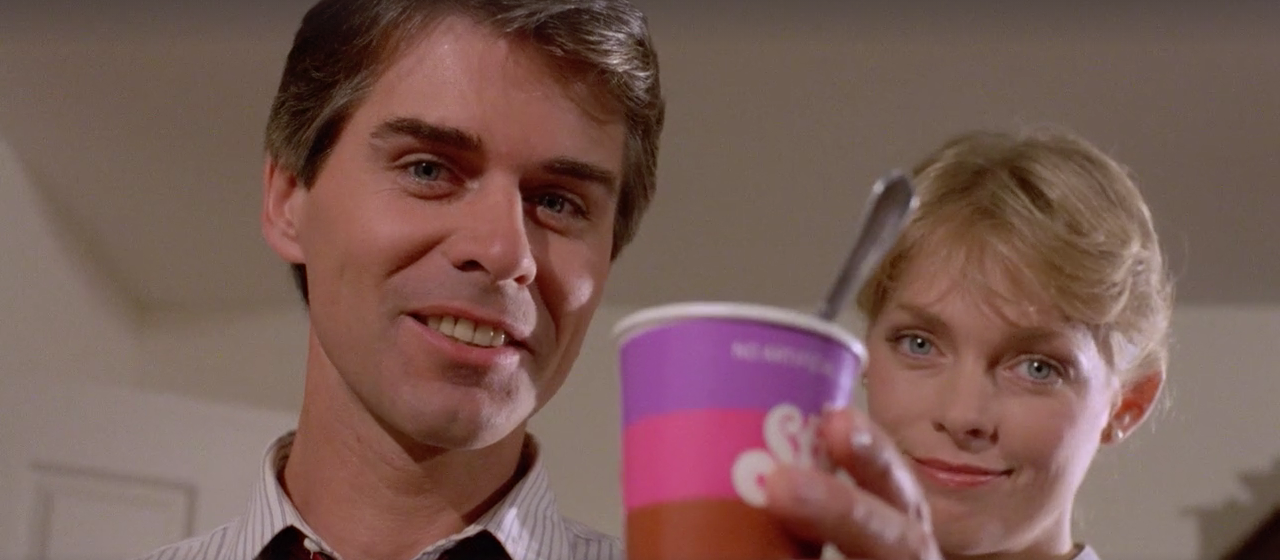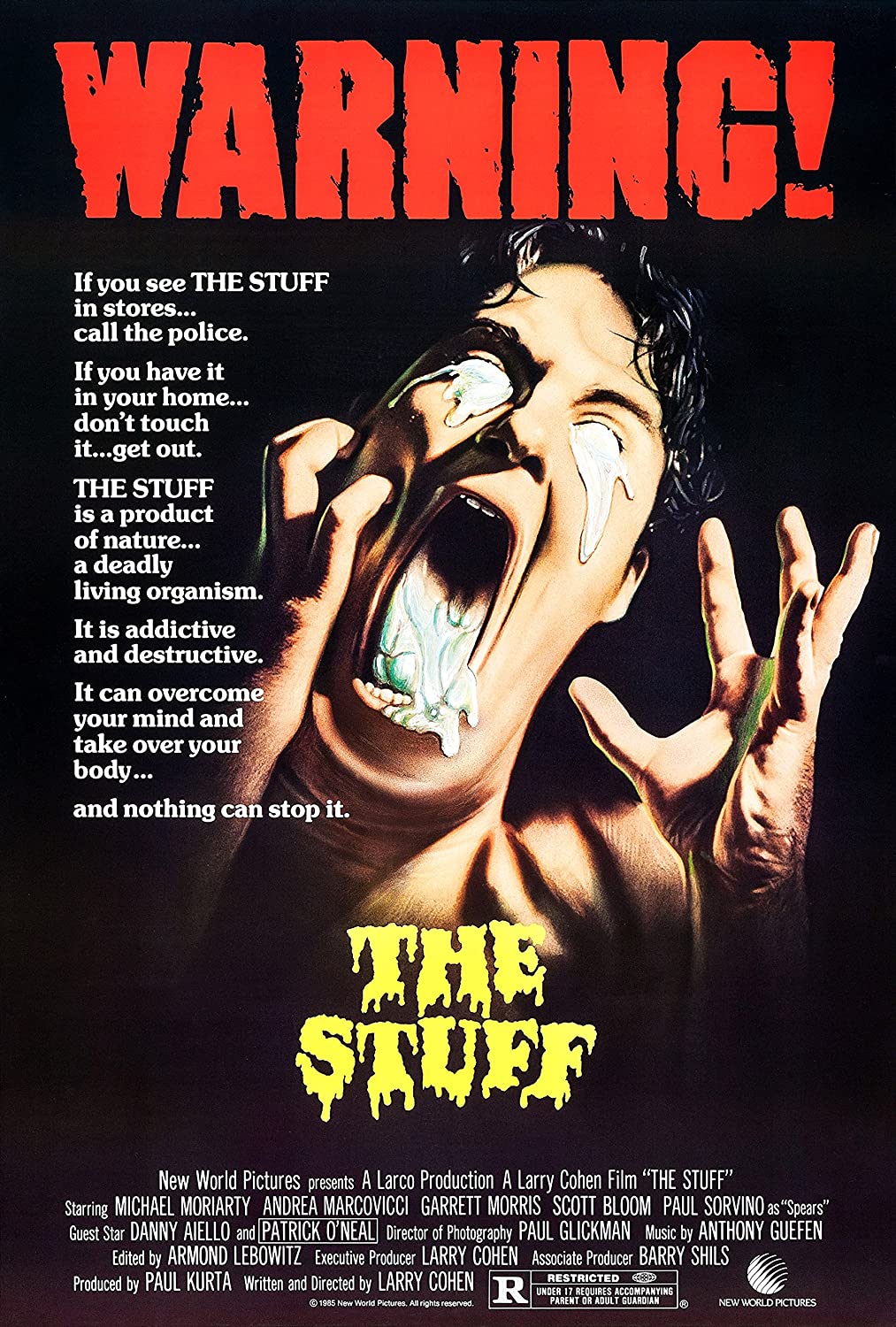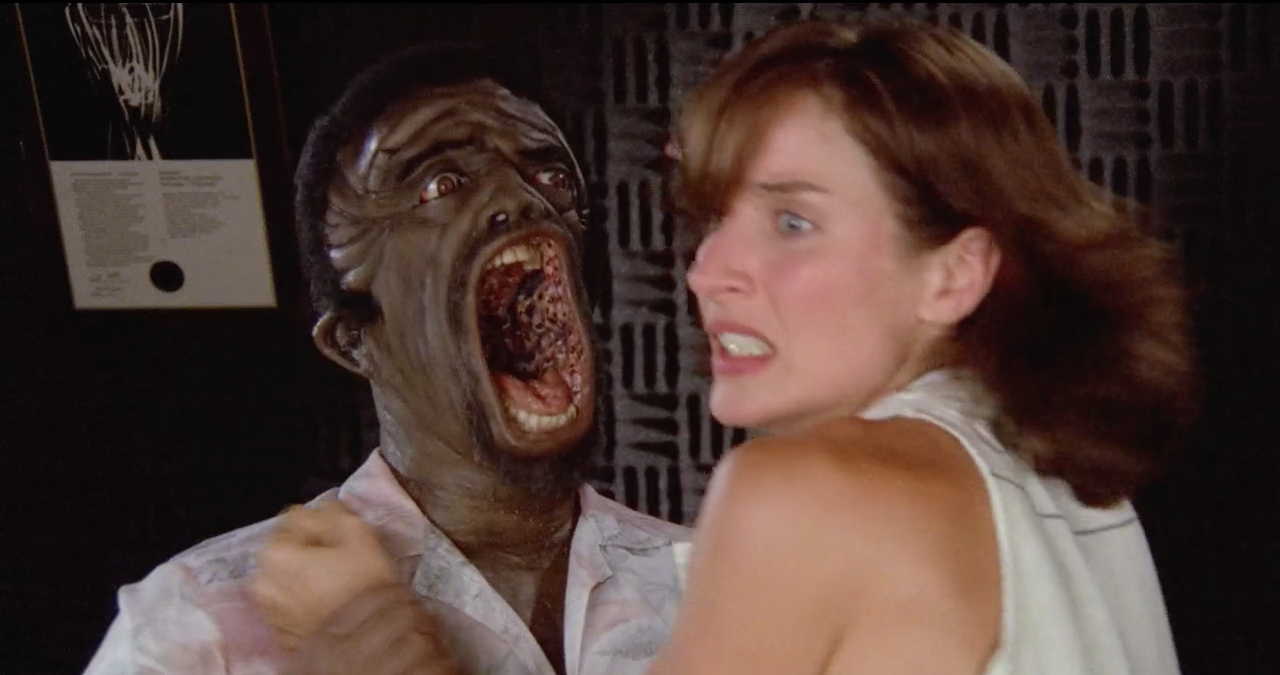

“Are you eating it… or is it eating you?”
Somehow Larry Cohen was able to write a screenplay based on the idea that a random railroad worker found some mysterious white goo bubbling up from the earth and stuck his tongue in it. The substance tastes amazing—so good that anyone who tries it becomes addicted. There seems to be an unending supply that replenishes itself naturally. Soon it’s being marketed with corny commercials, supermodels, pop jingles, and zippy slogans and shipped by the truckload all over the country. The entire nation is eating The Stuff, throwing away their old food and prosthelytizing others to this new way of life. It practically writes itself if you have a cynical-sarcastic view of our culture. Cohen’s oeuvre is stuffed full of oddball concept films that take a zany idea and build a half-serious world on top of it, and The Stuff ranks up there with his best conspiracy-laden satires—fun practical effects, a game cast, and a bunch of ridiculous left turns that only hold together because the throttle is kept wide open. It’s rough around the edges, but unexpectedly clever and full of small delights. A silly and entertaining movie made by an intelligent filmmaker looking for a free flowing creative outlet.
Just as ex-FBI agent David “Mo” Rutherford (Michael Moriarty) plays dumb so that his adversaries underestimate him, so The Stuff flaunts its B-movie aesthetic and endearing goofiness to soften it’s satirical punches. It relishes in evoking 1950s monster movies like The Blob and Invaders from Mars, making use of longstanding horror conventions, and leaning into its low-budget practical effects. It meanders through its plot without any sense of urgency, taking its cue from the imperturbable demeanor of Moriarty’s smooth-talking confidence trickster. Hired by ice cream executives in an effort to reverse the industry’s plummeting sales, Rutherford investigates the addictive dessert and finds that the situation is much deadlier than he had assumed. The Stuff is actually a living, semi-sentient parasite that moves of its own accord, taking control of its host once enough of it has been ingested. Once the brain has been seized, the “Stuffies” turn into creepy automatons, defending The Stuff and their access to it just like Heinlein’s hosts in The Puppet Masters.

On the prowl for a midnight snack, a young boy named Jason (Scott Bloom) becomes redpilled when he witnesses The Stuff in motion when he opens the fridge. Suspicious, he refuses to eat The Stuff and sadly watches as his family’s personalities, attitudes, and habits change under its influence. His parents send him to his room until he decides he is ready to eat The Stuff, which leads to a humorous scene in which he fakes it by eating shaving cream and then throws it all up in Rutherford’s car. “Well, everybody has to eat shaving cream once in a while,” Rutherford says (apparently Moriarty was allowed to improvise quite a bit of his dialogue, often to humorous effect).
Rutherford also manages to sweet talk Nicole (Andrea Marcovicci), an advertising executive responsible for The Stuff’s marketing campaign. Exposed to the truth, she uses her industry contacts to help Rutherford infiltrate the supply chain. Also fighting on the side of justice and decency is rambunctious sidekick Chocolate Chip Charlie (Garrett Morris), a disenfranchised junk food entrepreneur who claims his fists are registered as lethal weapons in Medford, Georgia. Charlie also gets the film’s grossest death scene. Once the bubbling mass of The Stuff is sabotaged by some expertly placed explosives, Rutherford enlists the help of right-wing conspiracy nut Colonel Malcolm Grommett Spears (Paul Sorvino), who has the ear of the nation and also commands a well-trained and at-ready militia. It’s a ridiculous veer into the absurd that Sorvino gamely sinks his teeth into. It takes Spears about two seconds to buy Rutherford’s lines about Communist infiltration before he begins barking orders. This excursion only half works but I like the audacity to lean into it.

It’s an outlandish story, for sure, but that’s what makes movies like this so much fun. The effects are perfectly suited to the tongue-in-cheek tone. The body effects—often focused on exploding or expanding heads and mouths, is basic but convincing enough to still feel a little gross. The oozing Stuff varies in its depiction depending on the scale of the scene, sometimes overlaid onto a shot, sometimes thrown all over the set. There’s one scene in particular that appears to have been a lot of fun to shoot. After Nicole has gotten them a tour of the distribution facility, the company arranges for them to stay at a local motel. Just as Mo and Nicole lay down to sleep, their mattress begins oozing The Stuff. It gloms onto Rutherford’s face. To save him, Nicole douses him with lamp oil and lights him on fire. A follow-up cleaner comes in to finish the hit, but The Stuff targets him, blasting him onto the wall and smothering him to death. For this gimcrack bit of nightmare imagery, Cohen recycled a rotating set from A Nightmare on Elm Street. It’s not nearly as gruesome or terrifying as the scene from that movie, but Cohen’s slimy free-for-all and impossible downward-licking flames seem just as creative as Wes Craven’s nightmare fuel.
The Stuff works best when it’s meta-commentary is taken into account. You know how cigarettes weren’t always required to say that they may cause cancer on the packaging? How they used to be advertised not just as harmless, but actually good for you? That’s the kind of angle Cohen’s going for with The Stuff. No one knows its origin, no one knows what’s in it, no one knows the long-term effects of excessive consumption. But there’s an endless sea of gullible people willing to buy any old addictive bit of poison if it’s sold to them with catchy jingles and good-looking faces. And there are plenty of ruthless profiteers willing to capitalize on the undiscerning masses. It points at our willingness to jump onto a popular trend without forming our own opinion on a thing, letting corporate advertisements dictate our taste and choose our diet for us—a critique that extends beyond the realm of food. Further, it takes jabs at our tendency to become smooth-brained apostles of a harmful idea or product that was foisted on us by greedy corporations who make money off of our addictions and ill health—an incredibly common occurrence only made worse by the advent of social media.

Late in the film, we witness a retail location for The Stuff—situated between two popular fast food restaurants—get blown to smithereens, the insinuations obvious. When Rutherford approaches the corporate moguls behind The Stuff, they try to calm him down with their new pitch—The Taste, which contains only 12% of The Stuff and is non-addictive. But Rutherford produces his two friends, Jason and a gun, the first carrying a case of The Stuff and the second aimed at the two moguls. He forces them to eat themselves to death at gunpoint. A coda points yet another incriminating finger at our willingness to harm one another for profit as The Stuff appears on the black market, its quality tested with a fingerful just like a mob boss would test the potency of a drug shipment.
The Stuff is a low-budget, high-concept film that has a lot of fun romping through its ridiculous storyline. Though often cheesy, it has a lot of intelligence lurking beneath its goofy surface and actually has a lot to say if you pick up on its subtext.
Sources:
Lambie, Ryan. “Why Larry Cohen’s The Stuff is a work of scruffy 80s genius”. Den of Geek. 12 March 2014.